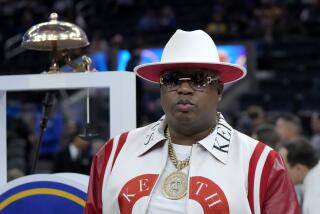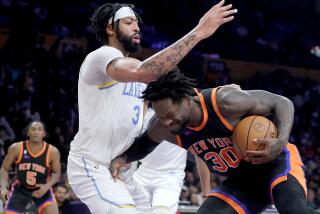It Was a Case of Robbery
- Share via
MIAMI — The distance to the “NBA Playoffs” logo from the Knicks bench at Miami Arena is 15 steps, maybe less than that for a man Patrick Ewing’s size, with a stride as long as his. White letters with a red outline on that logo, blue background, the same one painted onto the floor of every arena with a team in the playoffs. It is a small and unremarkable patch, up near halfcourt, colorful to the eye, invisible to the players, away from the real action closer to the basket. It doesn’t look anything at all like the place where a basketball season could end. But this place, this nowhere little corner of basketball, was the beginning of the end for Ewing and the Knicks, last Wednesday night.
All the games since November, seven months of games, all the pitch and tilt and buzz of more than 90 games, arrived there with Ewing at the end of Game 5 against the Heat. There was trouble with P.J. Brown and Charlie Ward and a lot of other Knicks under the Heat basket, directly across from the Knicks bench. Ewing walked away from that bench and over to the red-white-and-blue logo to get a better look. And the rest of this week, the rest of Ewing’s season, would never be the same.
Ewing walked from the logo down to the baseline after that. Then back to the bench. Too late. Too many steps for Patrick Ewing.
According to a ridiculously written rule in David Stern’s league, one without room for common sense or fairness, Ewing had committed a basketball crime that took him out of the next Knicks’ game, began a free fall for him and his team out of a 3-1 lead in games against the Heat, out of this series, out of a shot at Michael Jordan, out of what Ewing was sure was a tremendous shot at finally winning the title.
Finally out of the basketball season.
A short walk out of such a long season. At the end of a long sad road for Patrick Ewing.
“I was robbed,” Ewing was saying now, taking another walk, away from the interview area at Miami Arena, back towards the Knicks locker room, causing about as much trouble as he did with the walk at the end of Game 5 that got him suspended from Game 6, a suspension that did more than anything that cost the Knicks their season.
A few moments before, sitting there in the interview area, Ewing had evenly said, “(The NBA) robbed me of a great opportunity.”
So many things happened after the Knicks took that 3-1 lead with a rousing Game 4 last Monday night at Madison Square Garden. They could not put the Heat away in the second period of Game 5, when all the Heat players were ready to go. After all the suspensions resulting from the epic Ward-Brown, World Wrestling Federation battle, the Knicks could not hold a lead -- without Ewing, without Allan Houston, without Ward -- in Game 6.
Then in Game 7, Tim Hardaway was magnificent for the Heat. The Knicks turned the ball over way too much. There was an 18-0 Heat run in the first period and another devastating 15-1 Heat run at the end of the third that felt like a bomb going off under the Knicks. So at the end, this was one of so many games for Patrick Ewing at the start of his career, when it was him against the world. When no one covered his back. He scored 37 points. Didn’t matter. His team lost, 101-90. The Heat play the Bulls Tuesday night.
Where does Ewing go?
“Home,” he said in a flat, dead voice. He goes home two weeks short of June, two days short of Michael Jordan.
You can talk about rules and justice and what a stern judge David Stern is. But he has an idiot rule in place if the walk that Ewing took to the “NBA Playoffs” logo and then down in front of his own bench along the baseline is worth a season.
Give the Heat all the credit in the world for the way they came back this week. Blame the frightened Knick guards for the 15 turnovers they had Sunday. Blame Allan Houston for starting 1-for-9 and blame John Starks for being such a hothead. And in New York you can certainly talk all summer about the 11 minutes and 23 seconds that Alonzo Mourning sat out in the third and fourth quarter and how the Heat outscored the Knicks 23-19 while he was gone.
None of it happens if Ewing, who had nothing to do with anything at the end of Game 5, was not suspended from Game 6. A 15-step walk, maybe less, away from his bench, a walk down the baseline, a walk into the first day of his own summer.
Of course the Knicks had two more chances after that to win the series. But they had to try without three of their top players Friday, without John Starks and Larry Johnson on Sunday. If this rule about people off the bench leaving the bench is so crucial to the well-being of the NBA, then change another rule, and penalize everybody at once. Take all five of them out of the very next game. At least Game 7 would have been more of a fair fight. At least this series would not end the way it did, the Heat victory tainted forever, whatever Pat Riley says.
“I could’ve understood if we’d lost on the court,” Ewing said.
The Heat was better on the court Sunday. Hardaway was an even better player than Ewing with all the money on the table. Miami was ahead 17 points at halftime and it was still 17 going into the fourth quarter and even though the Knicks would get to within eight points late, that was that in Miami.
In the last minute, everything lost, Jeff Van Gundy took Ewing out of the game. This walk felt about 15 miles long to Ewing, back to the end of the bench, where he shook Herb Williams’ hand, took a white towel from a ballboy, sat down, stared blankly out at halfcourt. This time he stayed where he was until the game ended.
More to Read
Go beyond the scoreboard
Get the latest on L.A.'s teams in the daily Sports Report newsletter.
You may occasionally receive promotional content from the Los Angeles Times.










